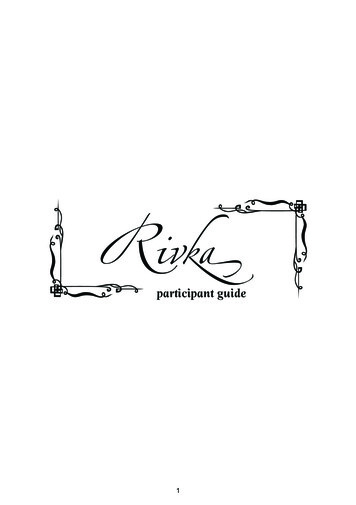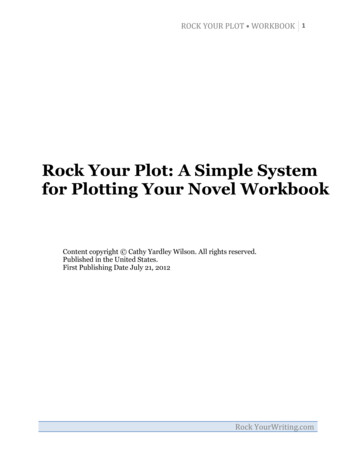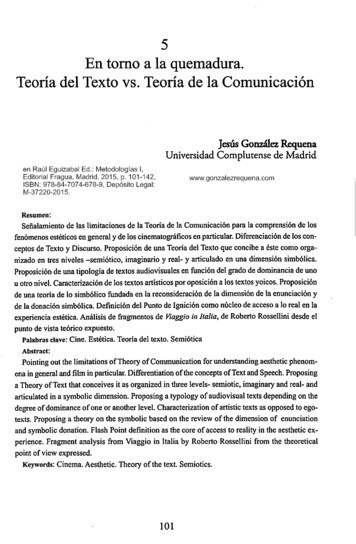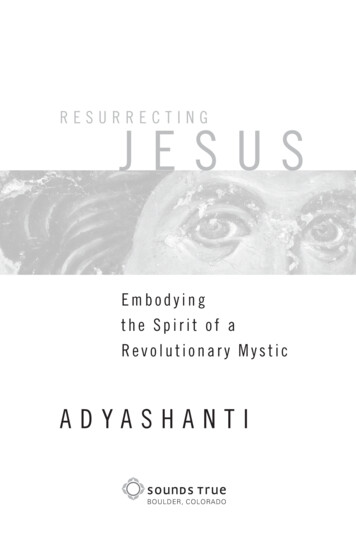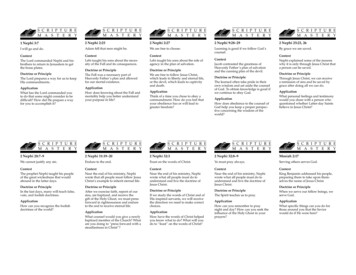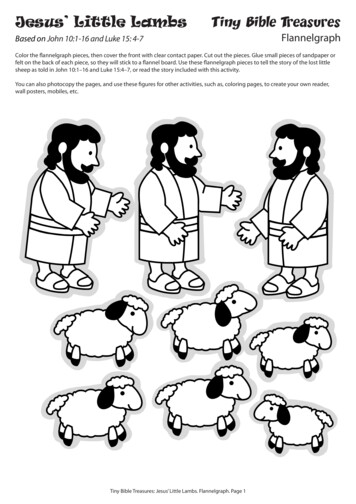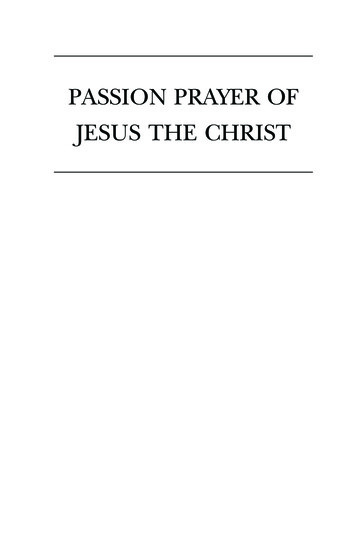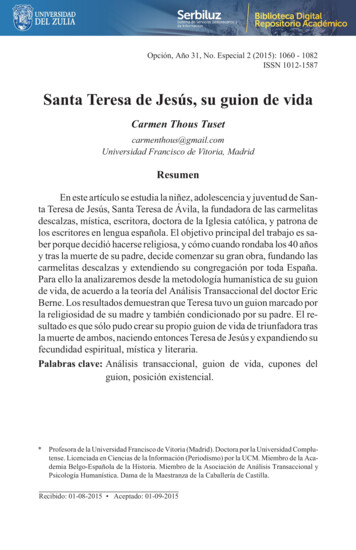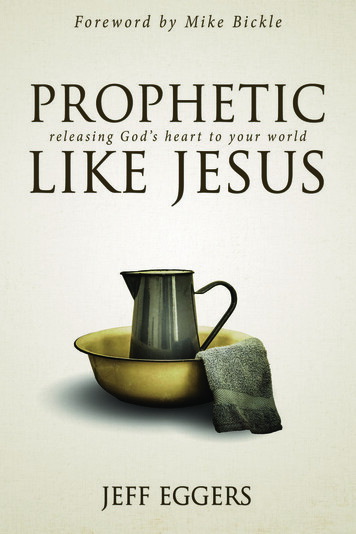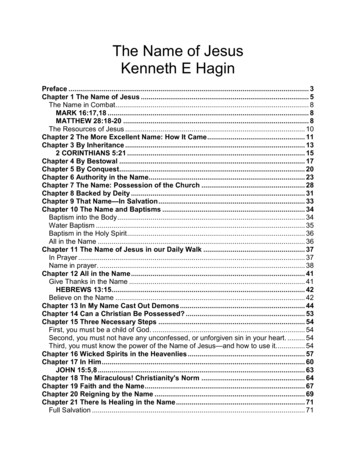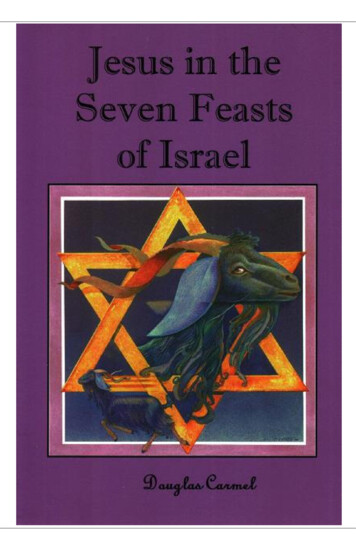
Transcription
1
2
3Jesus in theSeven FeastsOf Israel 2013 Douglas CarmelRock of Israel Ministries:Fairfield, Ohio 45018Any inquiries or comments about the content of this book should be directedto:Rock of Israel MinistriesP.O. Box 18038Fairfield, OH ginfo@rockofisrael.orgAll scriptures are taken from The Holy Bible, New King James Version,(Nashville, Tennessee: Thomas Nelson, Inc.) 1982.
4
5Table of ContentsChapter 1)Chapter 2)Chapter 3)Chapter 4)Chapter 5)Chapter 6)Chapter 7)Chapter 8)Chapter 9)ForwardIntroductionThe Feast of PassoverThe Feast of Unleavened BreadThe Feast of FirstfruitsThe Feast of WeeksThe Summer IntervalThe Feast of TrumpetsThe Day of AtonementThe Feast of TabernaclesSummaryMy 9
6
7ForwardMy son Doug, a devoted husband, father andson, speaks from the bottom of his heart. Theyears have come and gone, and what he believesin still lives on. He has poured out his heart andsoul to many who have heard him. He alsotraveled all over, near and far.Over the years he has studied much. He hasnow combined all his thoughts and written thisbook, which was his goal, to express what he haslearned by being a believer.I hope that when you come to the last page ofthis book, you will understand why I am the proudgrandmother of his five children and proud tohave him for a son.Marcia W.Middletown, New York
8
9IntroductionThere’s a humorous story told about three rabbis whohave a problem with mice in their Synagogue. Thefirst rabbi explains, “We called the best exterminatorin town and he couldn’t get them to leave.” Then thesecond rabbi exclaims, “We had the same thinghappen to us. We got the best pest control person intown to come over and he couldn’t get them to leaveeither!” Finally, the last rabbi says, “Well, we got ridof them all and it was pretty simple if you ask me. Allwe did was make them little yarmulke’s and gavethem little Bar-Mitzvah’s and we haven’t seen themsince!”While this story is cute, it also represents anunfortunate trend in modern Jewish society today.Most Jewish people are ignorant of their own JewishScriptures. The vast majority of Jewish youth todayattend synagogue before age 13 for the sole purpose ofpreparing for their Bar-Mitzvah. Once that event isaccomplished, there really is no more synagogueattendance or knowledge of the Hebrew Scriptures(what we commonly call the “Old Testament”) forthem.
10A Bar Mitzvah todayUp until 1986, I was one of those typical Jewishyouths as well. I was Bar-Mitzvah at the age of 13 (in1977) and that was the last time I attended synagogueon a regular weekly basis. Of course I was still insynagogue for all the important annual Jewish HolyDay services. However, I knew nothing of the JewishScriptures which should be the life blood of everyJewish person. How thankful I am that sincebecoming a believer in 1986, I have devoured the OldTestament again and again. I love to read it and I loveto teach on it. Why? Because I see Jesus throughoutthe Book.When talking to Jewish people one day, Jesus said,“For if you believed Moses, you would believe Me;for he wrote about Me.” (John 5:46) Moses wrote theTorah (Genesis – Deuteronomy). How is Jesus inthose books? By looking at the types and shadowsthere.
11It’s my prayer that as you read this book, you will beilluminated to see the original Seven Feasts of Israelin all their glory and then to see the Messiah of Israel– Jesus – in all His glory as the fulfillment of each ofthese Feasts. May God bless you as you begin thisnew journey.
12
13The Feast of Passover‘These are the feasts of the LORD, holy convocations which youshall proclaim at their appointed times.‘On the fourteenth day of the first month at twilight is theLORD’s Passover.Leviticus chapter 23: verses 4-5The first of the seven annual Feasts of the Lord isPassover. Hardly a person over 35 years old has notseen the epic movie production by Cecil B. DeMillecalled "The Ten Commandments". In thisblockbuster classic, Charlton Heston (Moses) andYule Brenner (Pharaoh) go head to head with eachother for Israel's freedom. Pharaohs’ power becomesless and less and Moses power becomes more andmore. Of course the movie ends with the famouscrossing of the Red Sea and Israel receiving the TenCommandments by the hand of Moses. It was a verygreat movie in its time.Above all else, we need to remember that althoughHollywood has taken much liberty with the story, theevent of Passover is an historical event. It is an eventthat happened in space / time history in a land calledEgypt and a continent called Africa. Let's brieflyreview what happened about 3,500 years ago.
14Israel had been in Egypt for 430 years. At first, thetrip there seemed like a good idea. There had been afamine, so Jacob and his entire family went down toEgypt because – as a surprise to him - his son Josephhad become the second in power only behind Pharaohhimself.Joseph sold into slavery by his brothers.He eventually became a leader in EgyptJoseph had instituted a wonderful food program inEgypt, so a trip there made perfect sense at the time.(If you don't know the whole story, I highly suggestyou read it in Genesis 37-48. It’s one of my favorites.)After many years had passed, a new Pharaoh came onthe scene (who knew not of Joseph) and the scenariochanged for Israel.Exodus 1:8-11Now there arose a new king over Egypt, who did not knowJoseph. And he said to his people, “Look, the people of thechildren of Israel are more and mightier than we; “come, let us
15deal shrewdly with them, lest they multiply, and it happen, inthe event of war, that they also join our enemies and fightagainst us, and so go up out of the land.” Therefore they settaskmasters over them to afflict them with their burdens. Andthey built for Pharaoh supply cities, Pithom and Raamses.Isn't life a lot like that sometimes? We start out withthe best of plans and then end up in slavery in a placewe don't want to be. But thankfully the story does notend there. It was just the beginning for Israel.Somewhere in Egypt one day, an Israelitewoman gave birth to a very special baby boy.Although forced infanticide was the will of thePharaoh for newborn Israelite boys, this woman wasnot afraid of the King's edict and hid her newborn sonfor several months. Eventually, she could not hide theboy any longer, so she put him in a basket on the NileRiver and sent big sister Miriam to watch over himfrom a distance. The Pharaoh’s daughter, at the NileRiver that morning, finds him there and names him"Drawn out" (or as we would say in English today"Moses.")Baby Moses finds a new home
16To top it off, Miriam suggests to Pharaoh’s daughterthat she knows a Hebrew woman who could nurse thebaby for her. It seemed like a good idea to Pharaoh’sdaughter and so baby Moses gets his mother back forthe time being.Eventually, Moses was raised in all the wisdom ofEgypt, however at some point in time, Mosesdiscovers that he is a Hebrew too. One day he has achoice to make. An Egyptian was beating a Hebrewslave right in front of him so Moses kills the Egyptian.The next day, trying to break up a fight between twoHebrews, they basically say to him, "Stay out of this.Who made you a ruler over us? You helped us bykilling that Egyptian yesterday and now you thinkyou’re our King and Ruler?!" (My paraphrase ofExodus 2:14)Obviously Egyptian CNN had covered the story andMoses knew that this would not sit to kindly withPharaoh. So Moses decides to pack his bags and takethe first chance he can to get out of Egypt and go tothe land of Midian.But this was all in God's plan. Moses thought that hecould deliver Israel by his own muscle, but theyrejected him. Ever feel like that? You only want tohelp, but somehow seem to make things worse?Moses then spent the next 40 years away from hispeople. Till one day he meets God. You remember
17the famous burning bush encounter. God tells himthat he (Moses) is going to return to Egypt to help hispeople - only this time God will be with him.Reluctantly, Moses agrees and finds his way intoPharaoh’s court announcing God's desire to free Israelso that they can worship Him.Pharaoh says 'no way' and turns the heat up on Israel'sslavery a notch or two. Go get your own straw forbricks. Keep the same number of bricks coming.yada, yada, yada. The reader of the text knows thatPharaoh’s days are numbered - only Pharaoh does notrealize it yet. You cannot go up against God and win.The Israelites apparently don't realize this either.They even get pretty 'ticked' with Moses at this point.Ever felt like that? "God, I prayed for help and thingsonly seem to be getting worse." Hang on; thankfullythe story does not end here.Nine plagues later, Egypt's economy is in shambles.Egypt's gods are wobbling. But Pharaoh still refusesto let them go. Now, he has offered Moses a fewcompromises along the way like ‘Go, but leave thechildren behind’ or ‘Go, but don’t go far’, but Moseswon't take anything less than 100%. I'll never forgetthe first night God woke me up to my spiritualcondition in May of 1986. I felt the conviction overmy sins big time and at 2:30 in the morning I began tomake deals with God. "Ok God, I'll cut this out 25%and that out 50%, etc."
18I had no peace that night until I gave God 100% ofwhat He wanted. God's kind of funny like that. Helikes to get His way all the time. (And thankfully so!)The ominous tenth plague is about to strike.Remember what Egypt did to the Hebrew baby boys?Well, the old statement, "what goes around, comesaround" is surely a biblical principal. To put it in thewords of scripture, "God is not mocked; for whatevera man sows, that he will also reap." (Galatians 6:7)To put it in my own words, Egypt will get a taste oftheir own medicine.Exodus 11:4-7Then Moses said, “Thus says the LORD: ‘About midnight I willgo out into the midst of Egypt; ‘and all the firstborn in the landof Egypt shall die, from the firstborn of Pharaoh who sits on histhrone, even to the firstborn of the female servant who is behindthe handmill, and all the firstborn of the animals. ‘Then thereshall be a great cry throughout all the land of Egypt, such aswas not like it before, nor shall be like it again. ‘But againstnone of the children of Israel shall a dog move its tongue,against man or beast, that you may know that the LORD doesmake a difference between the Egyptians and Israel.’All of Egypt will be devastated by this plague. Not ahome will be without a dead person in it. But Godtells Moses that the Israelites should do somethingvery specific to 'protect' themselves from this lastplague of death. Each family should (or if theyneeded, several small families could combine)separate out a one year-old male lamb from theirflock. Examine it for four days. Make sure that it has
19no spot or blemish. It must be a perfect lamb. On the14th day of the lunar month, the lamb was to be slain.The lambs’ blood was to be placed on the doorposts oftheir home - the top and sides of the door.The blood of the LambIt was applied with hyssop and probably applied bythe patriarch of the family. The lamb itself was thento be brought into the home and it was to be roastedover a fire that evening. The meal was also to consistof bitter herbs and bread made without yeast (seeExodus 12:8). Thus we have the first Seder meal.(Incidentally, the Seder meal is the meal today that theJewish people eat each year on that anniversary dateof Passover to commemorate what God did for themmany years ago that night in Egypt.)Since it was a full moon (the 14th day of the lunarmonth), what was done to the doorposts that eveningcould be see by all in the community. There were no
20'secret' believers in Egypt that night. No one couldhide his or her affiliation under that full moon. Eitherthere was lambs’ blood on your doorposts - or therewasn't. It was that simple. At midnight, the destroyerbegan his journey. Many people believe that it wasdeath itself that "passed over" the homes of theIsraelites that evening, but actually the scripture tellsus it was the Lord who "passed over" each home withthe lambs’ blood on it. The purpose of His passingover was to protect that family, "and when I see theblood, I will pass over you." (Ex 12:13). In otherwords, God Himself "passed over" (i.e. stopped) at thehome and kept death from entering in. The same word"Passover" (in Hebrew "Pesach") is used of the Lord"passing over" Jerusalem to protect it like a motherbird. "Like birds flying about, so will the LORD ofhosts defend Jerusalem. Defending, He will alsodeliver it; Passing over, He will preserve it.” (Isaiah31:5).So do you get the picture yet? Egypt kills Israel'schildren. God is now going to return the favor uponthe land of Egypt. However, His gracious provisionfor Israel was to show Him that blood had alreadybeen shed at their home. A substitute had died for theirfirstborn. A Lamb was slain.Now let's move forward in time to the first century the time period of Jesus. The city is Jerusalem. Theones now oppressing the Israelites are not Egyptians,but Romans. Many people are hearing of this itinerate
21Jewish preacher from the Galilee area who worksmiracles. The word on the streets is that He is arrivingin Jerusalem today. Wait, here he is! Riding on adonkey of all things? What does it matter! Goddelivered us once from the Egyptians and it looks likeHe will finally do it again, but this time from theRomans! Let's welcome him! Hosanna! Here Hecomes. Spread the palm branches. He will surelysave us from the Romans.Alfred Edersheim describes the scene:We can imagine it all – how the fire would leap fromheart to heart. So He was the promised Son of David –and the Kingdom was at hand! It may have been just asthe precise point of the road was reached, where ‘theCity of David’ first suddenly emerges into view, ‘at thedescent of the Mount of Olives,’ that the wholemultitude of the disciples began to rejoice and praiseGod with a loud voice for all the mighty works that theyhad seen’. As the burning words of joy and praise, therecord of what they had seen, passed from mouth tomouth, and they caught sight of ‘the City of David,’adorned as a bride to welcome her King – Davidic praiseto David’s Greater Son wakened the echoes of oldDavidic Psalms in the morning-light of theirfulfillment.”1Here we have Jesus coming into Jerusalem severaldays before the Passover. He uses His time in the citywisely - teaching and confronting the religiousleadership. The city population has swelled that weekbecause of the Jewish people arriving to celebrate the
22Jewish deliverance of Passover. The lambs will beslaughtered in a few days.The timing could not have been worse for the Templeleadership as author J. Dwight Pentecost explains,"The Jewish leaders saw the Passover as an opportunetime to put Jesus to death. They reasoned that if Israelaccepted Jesus as Messiah and He instituted a kingdom,Rome would move in and destroy this rival kingdom. Itseemed better to the Jewish leaders that one man shoulddie that the whole nation should perish at the hands ofRome."2The day of the Passover is near. Israel has beencelebrating an anniversary Seder meal every Passoverto remember what God did for them in Egypt centuriesago. Jesus and His disciples are going to celebratethat meal too. However, Jesus takes some of the keyelements of the Seder meal and infuses them with newmeaning. The unleavened bread He uses as aremembrance for His body and the fruit of the vine Heuses as a remembrance of His blood.That night in Israel, thousands of Seders will be goingon and fathers will tell their children about the bodyand the blood of that little spotless lamb fromcenturies ago. Jesus tells His disciples to begin toremember Him from now on. He is the Lamb.
23After the Seder meal, Jesus goes to a garden acrossfrom the city to pray. Of course earlier that eveningJesus was betrayed. The soldiers now arrive and arrestHim. All His disciples flee. After a series of short"trials," He is beaten and taken out by Roman soldiersto be publicly executed on a cross with three nails. Ofcourse blood is coming from all over Him due to thebeatings by the Romans, but the key thing to noticeare where the nails are placed. A nail on the left wrist,one on the right wrist, one on the ankles and a crownof thorns on His head.Look at the position of the blood coming from Him.Left, right, top and bottom. It's the same spots as thelittle lambs’ blood on the doorposts in Egypt manyyears ago. In Egypt, there was no blood put on thefloor, (probably out of respect - so as to not step onthe blood), but most certainly some would havedripped down from the top forming a cross at thefamily's front door sealing them and protecting themfrom judgment.Don’t you see it? In Egypt, there was nothing thatwould have protected the family except the lambs’blood. No amount of praying or giving of charity oranything else would have kept them safe. It was onlythe lambs’ blood that saved them from judgment thatnight. The same thing holds true today. It was said ofJesus, “Behold! The Lamb of God who takes away thesin of the world!” John 1:29. That means beingreligious does not save a person from their sins. No
24amount of charity, no amount of praying saves aperson. What saves a man from their sins is - when ina simple, but profound act of faith takes place.When you ask the Lamb of God into your heart. WhenHe comes in and places His own blood upon thedoorposts of your heart. It is then - and only then that you are 'saved' from God’s judgment.I remember as a child that our family would gettogether in upstate NY for Seder dinners. At the Sedereach year, a child is supposed to read "The FourQuestions" which help to better explain the Passoverto children. One year I was told that it was going tobe my turn to read them. For several weeks, Ipracticed them over and over again until I got themright and fully memorized. At the Seder meal werecalled the story of Passover and sang songs aboutour deliverance from Egypt. However, it was all sodistant. No talk about a current relationship with theGod who delivered us from Egypt. No talk about aGod who delivers us today in our daily lives.A Modern Passover Seder
25Today, as a believer I can say that I really do knowpersonally the same God who delivered Israel 3,500years ago. For over two decades now, I can rejoicethat I am free from the judgment of sin due to mebecause of the blood of the spotless Lamb, Jesus, theJewish Messiah.And just as Jewish people have a meal called theSeder to help them remember their deliverance fromEgypt, so to did Jesus give believers a meal toremember Him as the Lamb of God who delivers usfrom death. That meal is called Communion.Thank you God for saving me from death. Though itcost You so much, I would be lost without Yourblood. Thank you Messiah for enduring that sufferingfor me. Thank you from the bottom of my heart.Endnotes1) Alfred Edersheim, The Life and Times of Jesus theMessiah (Peabody, Massachusetts: HendricksonPublishers, 1993), p. 728.2) J. Dwight Pentecost, The Words and Works of JesusChrist (Grand Rapids, Michigan: Academie Books /Zondervan Publishing House, 1981), pp. 369-370
26
27The Feast of Unleavened Bread‘And on the fifteenth day of the same month is the Feast ofUnleavened Bread to the LORD; seven days you must eatunleavened bread.Leviticus chapter 23: verse 6Deeply associated with the holiday of Passover is thefeast of Unleavened Bread. Perhaps you have heard ofunleavened bread today by its more common name "Matzah." And although Passover and UnleavenedBread have 'merged' in the modern Jewish mindset asone holiday, biblically they are two distinct events. Solet's take a look at the Feast of Unleavened Bread andits relationship to Passover.The Feast of Unleavened Bread is a seven-day event.It begins on the 15th day of the Jewish month of Nisan(usually correspondi
We got the best pest control person in town to come over and he couldn’t get them to leave either!” Finally, the last rabbi says, “Well, we got rid . Exodus 11:4-7 Then Moses said, “Thus says the LORD: ‘About midnight I will go out into t
